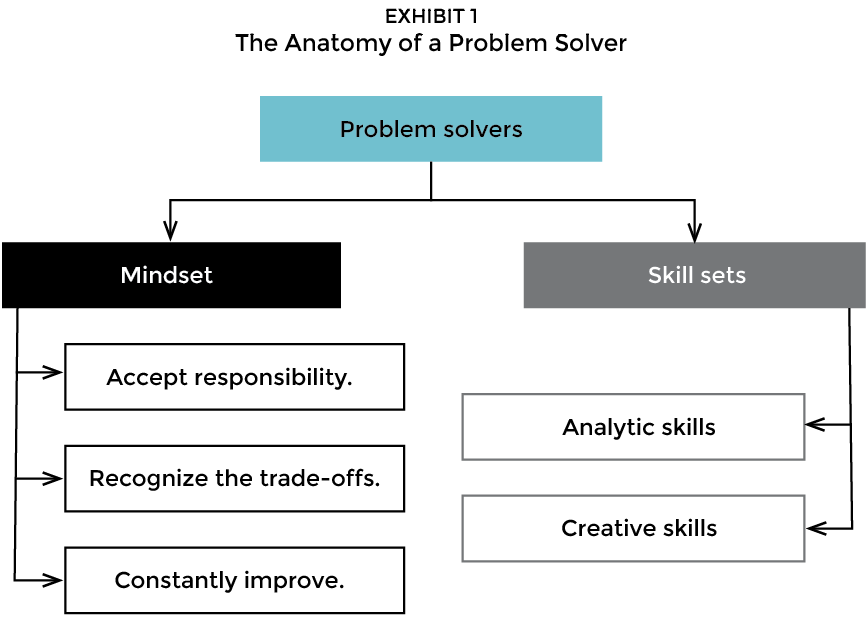Key Takeaways
- There are three rules of effective problem solving: Accept responsibility, recognize the trade-offs and constantly improve.
- Combining analytic and creative skills will boost your problem-solving power.
- Get help solving problems from trusted members of your team or advisors.

In life—be it professional or personal—problems are inevitable. If you think you can avoid them, you’re fooling yourself (and probably wasting too much time trying). The self-made Super Rich—those with a net worth of $500 million or more—understand better than the rest of us the nature of challenges and how to tackle them.
There are, of course, many traits and characteristics that separate the wealthiest among us from their less successful peers. We’ve found that one of the most important is being a problem solver when it comes to their challenges.
Here’s how they approach and overcome the hurdles that life throws at them—and what you can learn from their methods.
Part mindset, part skill set
The Super Rich recognize an important fact: The meaning of each problem you face is dependent on how you choose to think about it and what actions you decide to take.
Being a truly effective problem solver is part mindset and part skill set (see Exhibit 1). Problem solvers have a certain perspective on the world that centers on accepting responsibility and knowing they are going to have to make trade-offs. They also have the drive to continually improve their problem-solving capabilities, refining and reinforcing their skill sets and their confidence in their abilities.

Three rules for effective problem solving
When it comes to working through problems, different problem solvers tend to employ various cognitive tools, techniques and processes (depending on circumstances). That said, there are three rules that are typically vital to highly effective problem solving:
- Accept responsibility.
- Recognize the trade-offs.
- Constantly improve.
1. Accept responsibility.
One of the more pronounced distinctions between the self-made Super Rich and those less affluent is that the Super Rich readily accept responsibility.
Important: You must differentiate between blame and responsibility. Blame is identifying who or what is at fault. Say, for example, that you own a business (as do many of the Super Rich). Your company might be suffering because the entire economy is in a serious recession. The economy is to blame, in that case. However, you are still responsible for the success of your business. Because of your responsibility, you must decide in that situation what actions you are going to take. Likewise, a division in your company might be doing poorly because the person running it is not up to the job. The blame for the division’s poor performance lies with the person running it. But ultimately you are responsible—so what action are you taking?
This distinction is one that the self-made Super Rich make consistently over time. Many times, we cannot control what happens to us professionally or personally. We can, nevertheless, determine how we respond to these circumstances. The great majority of the self-made Super Rich regularly accept responsibility.
Action step: Identify three situations (professional or personal) in which a set of circumstances or another person was clearly to blame for negative results. How did you react? Did you take responsibility and come up with a solution—or did you “pass the buck”?
2. Recognize trade-offs.
The self-made Super Rich accept that the problem-solving process is replete with trade-offs. Put another way, solving problems means making sacrifices.
Just about all situations entail taking actions that limit you in some way or another. Say, for example, your sales team is not closing enough business. You might decide that the solution is to start accompanying them on many of their sales calls. The trade-off may be spending less time on other activities in your business or personal life.
Being an adept problem solver involves clearly understanding the trade-offs you face—and their implications. By being cognizant of the sacrifices that go with your solutions, you will likely be better able to effectively implement a plan for success.
Note: Often there will be unintended consequences of the decisions you make—a trade-off that surprises you. But the aim is to make calculated responses. Taking this approach can go a long way toward not second-guessing yourself.
Action step: Describe the solutions you came up with to the three problems from above. Specify the trade-offs you made or would have to make to implement your solutions. Are they acceptable to you? Why or why not?
3. Constantly improve.
Even when people achieve their goals and solve their challenges, different problems persist or crop up—even for the Super Rich, who may experience significant anxiety at the thought of regressing economically by losing the great wealth they’ve amassed. Problems, which are part of being human, produce failures and mistakes. Avoiding failures and mistakes—big and small—is pretty much impossible.
That means you must continually enhance and strengthen your problem-solving skills. If you try to just move forward from a problem or poor result, you won’t understand the errors that led to the bad situation—which increases the likelihood that it will happen again down the road.
We’ve noticed that the self-made Super Rich accept that they make mistakes when solving problems—they’re almost enthusiastic in their acceptance, in fact. While many people see making mistakes as a negative, the self-made Super Rich view it as an opportunity to become increasingly better problem solvers.
Action step: Think about three sets of solutions you used to solve three problems that did not get you the results you wanted. Think about exactly why the solutions didn’t work and what lessons you learned from the process of stumbling. Performing this type of “autopsy” on past experiences can help illuminate the right path the next time.
Your problem-solving skill set
Broadly speaking, there are two types of problem-solving skills: analytic and creative.
1. Analytic skills
Systematic, logical thinking is very effective in selecting the best alternative courses of action from a range of possibilities. The following are examples of analytic techniques that the Super Rich often use when solving problems:
- Structured analogies. This is the use of analogical reasoning where there are multiple comparisons, and the way each analogy connects to the problem and the solutions produced is clearly delineated.
- Devil’s advocacy. This is the process of critiquing proposed solutions, thereby better ensuring that various possible solutions are all seriously considered.
- Scenario analysis. By identifying different scenarios, it is possible to reduce uncertainty and determine superior courses of action.
2. Creative skills
Being clever, imaginative and ingenious is often needed when cold logic will not produce viable solutions. There are a number of core qualities to creative problem solving, including these:
- Producing many possible solutions
- Producing a broad array of possible solutions
- Producing unique and original possible solutions
- Expanding on possible solutions in innovative ways
Some possible structured techniques used to promote creativity include:
- Brainstorming. This is a process of generating diverse and extensive possible solutions.
- Starbursting. This is a form of brainstorming that generates questions and then focuses on generating ideas and answers.
- Morphological analysis. This is a process for evaluating all the various relationships dealing with the problem—systematically looking at all the combinations of variables.

Important: It’s possible you might possess both of these skill sets yourself. But chances are you’re either more creative or more analytical—not equally both. If so, be sure to enlist the help of others who can add value and insight in the skill area where you need help.
Great business, great life
Problems and challenges are part of life and part of business. How you react to them can play a huge role in the level of success you ultimately achieve. By adopting some of the problem-solving attitudes and actions of the self-made Super Rich, you can potentially put yourself in the best possible position to address whatever issues come your way—and, as a result, build a great business as well as a great life.


0 Comments